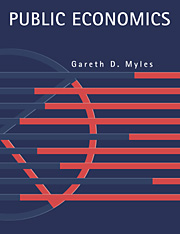Book contents
10 - Externalities
Published online by Cambridge University Press: 05 June 2012
Summary
INTRODUCTION
An externality represents a connection between economic agents which lies outside the price system of the economy. As the level of externality generated is not controlled directly by price, the standard efficiency theorems on market equilibrium cannot be applied. The market failure that can result raises a potential role for correction through policy intervention.
Externalities and their control are a subject of increasing practical importance. The greenhouse effect is one of the most significant examples of the consequences of an externality but there are any number of others, from purely local environmental issues to similarly global ones. Although these may not appear at first sight to be economic problems, many of the policy responses to their existence have been based on the economic theory of externalities. The purpose of this chapter is to demonstrate the consequences of the existence of externalities and to the review policy responses that have been suggested. In particular, it will be shown how the unregulated economy generally fails to reach an efficient outcome and to what degree this can be corrected using standard tax instruments.
The chapter begins with a discussion of alternative definitions of an externality which differ in whether they focus on effects or consequences. Adopting an effect-based definition, it is then shown how the market generally fails to achieve efficiency. This lack of efficiency is contrasted to the claim of the Coase theorem that efficiency will be eliminated by trade.
- Type
- Chapter
- Information
- Public Economics , pp. 312 - 347Publisher: Cambridge University PressPrint publication year: 1995



